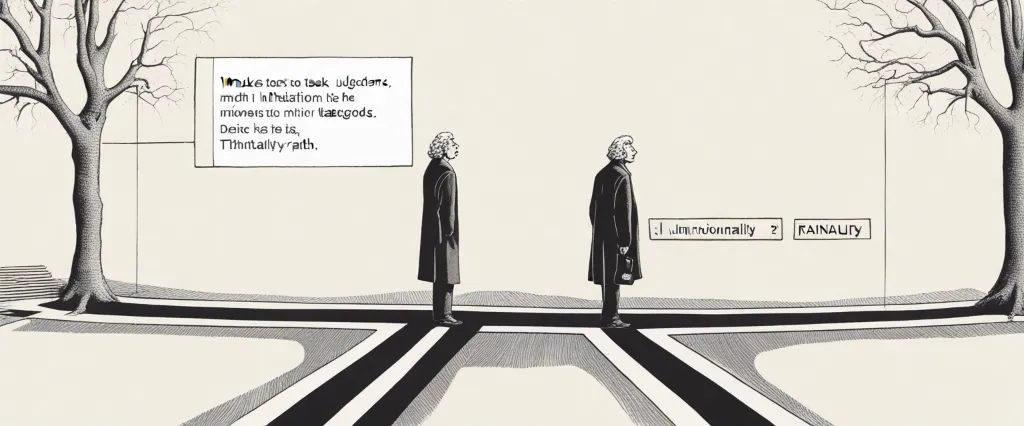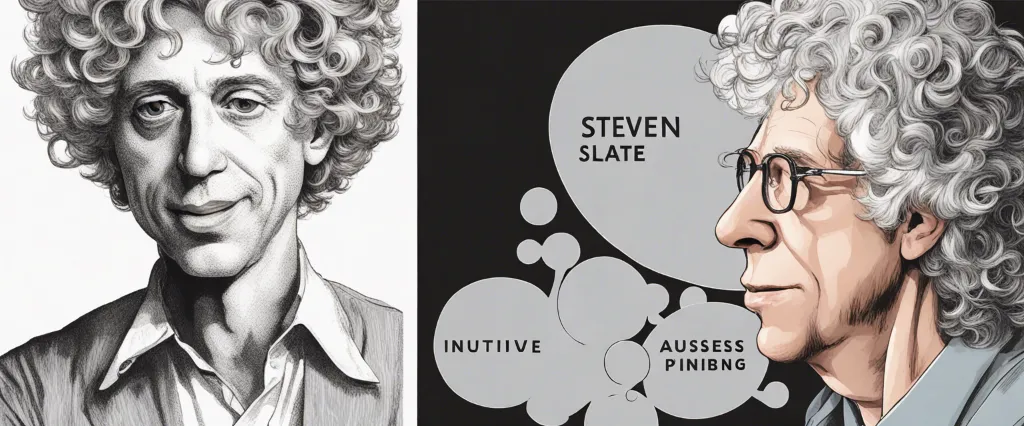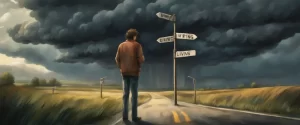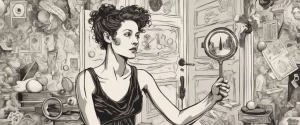——The Blank Slate by Steven Pinker & Being Mortal by Atul Gawande

In the vast spectrum of human knowledge, few subjects engage us more deeply than the complexities of our own existence. Exploring the multiple facets of what it means to be human, authors continually grapple with the intricacies of our nature, seeking to shed light on our human condition. Two such prominent voices in contemporary literature are Steven Pinker and Atul Gawande. In their respective works, “The Blank Slate” and “Being Mortal,” Pinker and Gawande courageously dive into the realms of genetics, consciousness, mortality, and societal constructs, offering us profound insights into the human experience.
In “The Blank Slate: The Modern Denial of Human Nature,” Steven Pinker challenges the longstanding belief in the mind’s complete “blank slate” at birth, arguing instead for the existence of a universal human nature shaped by our evolutionary history. Massively influential, this book sparked fervent debates in various disciplines, including psychology, philosophy, and sociology. Pinker embarks on a quest to dismantle the dogmas surrounding human behavior, demonstrating how our genetic and evolutionary heritage profoundly affects our thoughts, emotions, and actions. Through meticulously examining empirical evidence and engaging anecdotes, Pinker delves into contentious topics such as aggression, gender differences, and the nature-nurture debate.
On the other hand, Atul Gawande, a renowned surgeon, addresses one of the most universally shared experiences – mortality – in his critically acclaimed book, “Being Mortal: Medicine and What Matters in the End.” Combining his medical expertise with insightful storytelling, Gawande brings to the forefront the uncomfortable reality of our mortality and society’s often flawed approach to end-of-life care. With compassion and thoughtfulness, he reflects on the balance between medicine’s power to prolong life and the quality of that extension, highlighting our fundamental human need for connection, purpose, and autonomy until the very end. “Being Mortal” steers readers through the intricacies of aging, terminal illnesses, and the institutionalization of care, encouraging a candid examination of how we, as individuals and as a society, can better confront the inevitability of death.
While “The Blank Slate” and “Being Mortal” differ in their thematic focus, they share a common motivation – to unravel the various layers of human existence in order to foster greater understanding and better lives for individuals and communities. This comparative study aims to explore the ways in which Pinker and Gawande approach these explorations, analyzing their methodologies, viewpoints, and the impact of their ideas. By examining the concepts of human nature and mortality, we hope to gain a more profound appreciation for the complexities of our individual and collective lives.
As we delve into Pinker’s examination of human nature and Gawande’s exploration of mortality, we will explore the questions raised by these remarkable authors: What does it mean to be human, and how do our innate characteristics shape our actions and interactions? Is there a better, more compassionate way to approach end-of-life care in our society? Ultimately, through this comparative study, we seek to shed light on our shared humanity and to inspire conversations that challenge preconceived notions, leading us towards a more compassionate and understanding future.
Keyword: Comparative study, Steven Pinker, Atul Gawande, The Blank Slate, Being Mortal, human nature, mortality, societal constructs, consciousness, evolutionary history, end-of-life care.
Brief Summary of Two Books
The Blank Slate by Steven Pinker
“The Blank Slate: The Modern Denial of Human Nature” is a book written by cognitive psychologist and linguist Steven Pinker. Published in 2002, it challenges the popular belief that human behavior is shaped entirely by nurture, arguing instead for the existence of a universal nature that influences our attitudes, emotions, intelligence, and morality.
Pinker starts by explaining the concept of the “blank slate” — the idea that humans are born with empty minds and are purely molded by their environment. He then delves into the history of this idea, exploring its origins and influence on various fields such as psychology, sociology, and politics.
Drawing from a wide range of scientific disciplines, Pinker presents evidence to support his argument for the existence of human nature. He explores findings from genetic studies, neuroscience, psychology, and evolutionary biology to demonstrate how innate factors are critical in shaping our behavior and traits.
Furthermore, Pinker critiques the negative consequences of the blank slate ideology, such as its influence on social policies and its denial of individual differences. He argues that understanding our innate predispositions can lead to better decision-making, improved public policy, and a more accurate understanding of ourselves as human beings.
Pinker also examines the ethical implications of accepting human nature, addressing the concern that acknowledging innate aspects of behavior might lead to fatalism or justify prejudice. While recognizing the importance of environmental factors and cultural influences, he highlights the need to strike a balance and embrace a more nuanced understanding of the interplay between nature and nurture.
In summary, “The Blank Slate” challenges the prevailing notion that human beings are born as blank slates and proposes that our behavior is shaped by a combination of nature and nurture. It emphasizes the significance of acknowledging innate human nature as a means to better understand ourselves and improve society.
Being Mortal by Atul Gawande
Being Mortal” by Atul Gawande is a thought-provoking book that explores aging, mortality, and the modern healthcare system. Gawande draws on his experiences as a surgeon and a son to challenge the conventional approach to aging and end-of-life care.
The book starts by acknowledging the difficulties faced by the aging population due to physical limitations, chronic illnesses, and loss of independence. It highlights the paradox in modern medicine, where the focus is often on prolonging life rather than enhancing the quality of life.
Gawande continues by discussing nursing homes and assisted living facilities, highlighting the challenges faced by residents in terms of loss of control and autonomy. He proposes that a more person-centered approach should be adopted, prioritizing the individual’s desires, values, and preferences.
The author explores the concept of mortality and the reluctance of both doctors and patients to discuss end-of-life choices. Gawande emphasizes the importance of having honest conversations about death, hoping to bridge the gap between medical professionals and patients to ensure that patients’ wishes are respected.
He introduces the concept of palliative care, explaining how it can improve the quality of life for seriously ill patients. Gawande provides numerous examples of how palliative care can offer comfort, support, and control over one’s own fate, focusing not only on medical needs but also on emotional and psychological aspects.
Additionally, the book examines the flaws in the healthcare system’s approach to terminal illnesses, specifically the overemphasis on aggressive and often unnecessary treatments. Gawande proposes that a shift should occur towards a more patient-centric model of care, where doctors understand and respect their patients’ priorities.
Ultimately, “Being Mortal” urges society to reconsider its perception of mortality and to reshape medical practices, offering a fresh perspective on how to live well and meaningfully until the end of life.
Comparison between Two Books

Similarities in Know Yourself
In both The Blank Slate by Steven Pinker and Being Mortal by Atul Gawande, a common theme that emerges is the importance of knowing oneself and understanding the human condition.
Firstly, both books emphasize the significance of self-awareness and introspection. Pinker explores the idea of human nature and argues against the concept of a “blank slate,” highlighting the innate qualities and predispositions that shape our thoughts, emotions, and actions. Similarly, Gawande’s Being Mortal delves into the subject of mortality and end-of-life care, prompting individuals to confront their own mortality and make decisions about their final stages of life. Both authors encourage readers to reflect on themselves and their beliefs, challenging societal norms and prompting a deeper understanding of personal values.
Additionally, both Pinker and Gawande stress the necessity of acknowledging one’s limitations and imperfections. Pinker argues that accepting our innate human nature, with all its flaws and biases, is crucial for personal growth and societal progress. He contends that attempting to erase or disregard these inherent qualities can lead to misguided policies and unrealistic expectations. Gawande, on the other hand, acknowledges the frailties of the human body, particularly during old age and illness. He advocates for a holistic approach to end-of-life care, embracing the idea that accepting our limitations and prioritizing quality of life over mere longevity can lead to a more fulfilling and dignified experience.
Furthermore, both authors highlight the significance of open-mindedness and seeking knowledge outside one’s comfort zone. Pinker examines the intertwined relationship between biology, genetics, and culture, challenging readers to consider multidisciplinary perspectives when understanding human behavior. Similarly, Gawande challenges conventional notions of aging, illness, and death, urging readers to reevaluate societal attitudes and explore alternative approaches to healthcare. Both authors encourage readers to challenge preconceived notions and expand their understanding of the world, emphasizing the importance of self-reflection and intellectual curiosity.
In conclusion, although The Blank Slate and Being Mortal delved into vastly different topics, they share the common thread of emphasizing the value of knowing oneself. Both Pinker and Gawande urge readers to introspect, acknowledge their limitations, and embrace personal growth. Through their works, they ultimately inspire individuals to approach life and its challenges with self-awareness, open-mindedness, and a deeper understanding of the human condition.
Divergences in Know Yourself
The Blank Slate by Steven Pinker and Being Mortal by Atul Gawande are two highly acclaimed books that delve into different aspects of human existence. While Pinker focuses on the concept of human nature and the implications of denying it, Gawande tackles the subject of mortality and end-of-life care. Both books offer valuable insights into the human experience, but they diverge in their treatment of the topic of “Know Yourself.”
In The Blank Slate, Pinker challenges the idea of a blank slate, arguing that humans are not born as completely malleable beings but rather possess innate characteristics shaped by evolution and genetics. Pinker suggests that understanding oneself requires recognizing these inherent traits and accepting the existence of a human nature that influences behavior and cognition. He emphasizes the importance of acknowledging these predispositions in order to gain a more realistic perspective on human behavior, identity, and society.
On the other hand, Being Mortal approaches the notion of “Know Yourself” from a different angle, focusing on the exploration of personal values and autonomy in the context of end-of-life care. Gawande urges individuals to reflect on their desires, goals, and priorities as they face their own mortality. He emphasizes the significance of understanding oneself and articulating those values to healthcare providers and loved ones, especially when making difficult decisions about medical interventions and treatments.
One could argue that the divergence between these books lies in the different spheres they examine. The Blank Slate deals primarily with human nature and the role it plays in shaping individual identity and society, while Being Mortal centers on the individual’s understanding of their own preferences and desires within the context of their mortality. While Pinker addresses a broader concept of “Know Yourself” in relation to innate human characteristics, Gawande’s focus is more specific, prompting readers to introspect on their values and communicate them effectively.
Additionally, the diverging perspectives can be seen in the varying implications of “Know Yourself” presented in these books. Pinker’s argument emphasizes the importance of recognizing and accepting human nature as a foundational step towards self-understanding. In contrast, Gawande’s approach relates “Know Yourself” to the process of self-reflection and decision-making in the face of mortality, promoting the idea that understanding one’s values and priorities is crucial for receiving appropriate end-of-life care.
In conclusion, The Blank Slate by Steven Pinker and Being Mortal by Atul Gawande present distinct perspectives on the topic of “Know Yourself.” While Pinker focuses on the recognition of innate human nature, Gawande explores self-reflection and understanding within the context of mortality. While Pinker examines the broader implications of human nature, Gawande’s approach is more specific, urging individuals to evaluate their values for end-of-life decision-making. Despite their differences, both books offer valuable insights into the multifaceted nature of self-understanding and its significance in various aspects of life.

Conclusion
Both The Blank Slate by Steven Pinker and Being Mortal by Atul Gawande are highly regarded books and each offers unique insights into different aspects of human nature and experience.
The Blank Slate is a groundbreaking work that challenges the long-standing belief in human nature as a blank slate. Pinker proposes that human behavior is not solely determined by societal influences but is influenced by our genetic inheritance. He examines various aspects of human behavior such as aggression, sexuality, and morality, offering a scientific perspective that challenges prevailing dogmas. The book is praised for its rigorous analysis and thought-provoking arguments, contributing to the understanding of human nature.
Being Mortal, on the other hand, explores the topic of mortality and end-of-life care. Atul Gawande, a prominent surgeon and writer, delves into the shortcomings of medical care when dealing with aging and terminal illness. He presents moving stories and personal experiences, and raises important questions about the quality of life for individuals facing serious illnesses. Gawande challenges conventional medical practices and advocates for a more human-centered approach, emphasizing the importance of dignity and autonomy for patients.
Both books offer valuable insights, but the choice depends on individual interests and preferences. If you are interested in understanding the complex nature of human behavior, challenging prevailing notions of human nature, and exploring the interplay between genetics and society, The Blank Slate may be a more suitable choice for you. On the other hand, if you are interested in exploring the ethics of medical care, improving end-of-life experiences, and reflecting on the meaning of a good life, Being Mortal would be a more fitting book to read. Ultimately, both books contribute richly to their respective fields and are worthy of consideration based on your personal interests.


